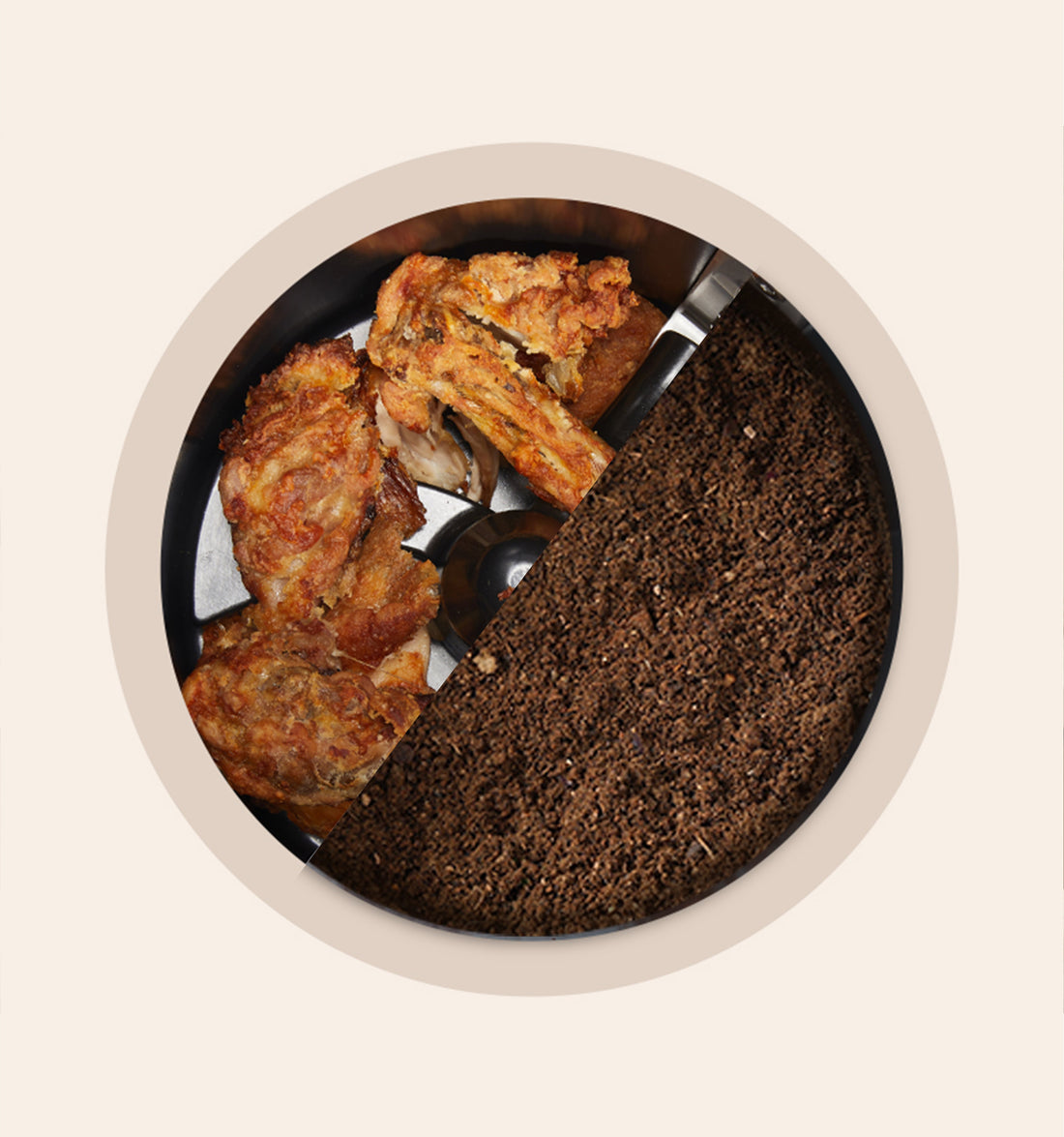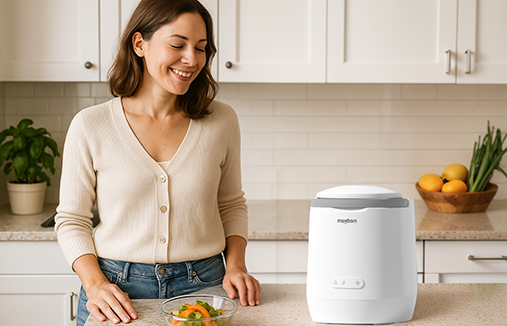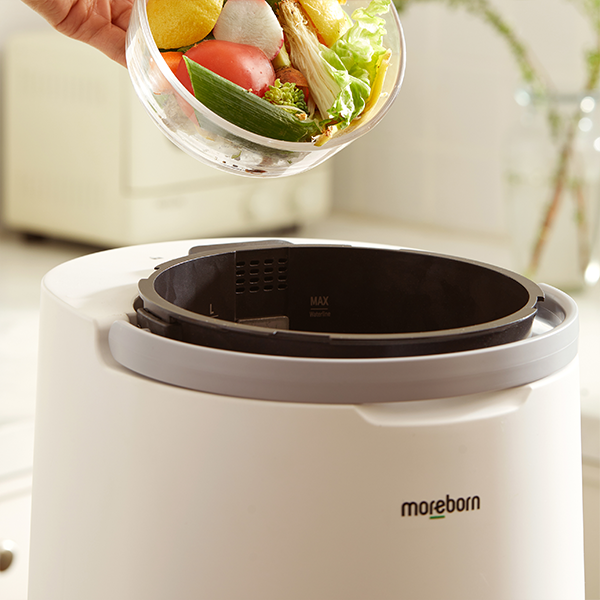
3 Surprising Facts About the Best Electronic Composter
Share
You might ask if the best electronic composter is good for your home. Many people pick these machines because they work quickly, fit in small places, and help cut down on waste.
-
In North America and Europe, more people use electronic composters because they care about the environment and like smart features.
-
In Asia-Pacific, more people use them as cities want better ways to handle waste.
You will see that a food cycler can change food scraps into dry stuff in just a few hours, but it does not make finished compost. Some people say that using energy and changing filters are problems. Knowing these things helps you see how electronic composters are different from old ways.
Key Takeaways
-
Electronic composters change food scraps into dry stuff in less than a day. This saves time and keeps your kitchen cleaner.
-
These machines are simple to use with just one button. They have smart features that make composting easy and neat inside your home.
-
Filters and tight lids stop bad smells from getting out. This keeps your kitchen smelling good and helps keep bugs and mice away.
-
Using an electronic composter cuts down on food waste and methane gas. This is good for the environment.
-
Electronic composters cost more at first and need power and new filters. Think about your space, money, and what you need before you buy one.
Speed

Fast Results
You want quick results when dealing with kitchen waste. The best electronic composters can process food scraps in less than 24 hours. For example, the Moreborn Food Recycler MB4 uses thermal acceleration technology to turn waste into compost in about a day. This is much faster than traditional composting, which can take weeks or even months. The MB4 also has an automatic cleaning cycle that finishes in just 30 minutes. Many users like this speed because it means less waiting and less mess in the kitchen.
-
You get less waste piling up on your counter.
-
The air in your home stays fresher because food scraps do not sit around.
-
You can use the dry, processed material in your garden within weeks.
Most users say that fast processing makes composting easier and more pleasant. You do not need to check on a pile outside or worry about turning it by hand.
Time Savings
Busy people need solutions that fit their schedules. Electronic composters help you save time every day. Some models can finish a cycle in as little as 10 hours. You can even track the progress with a mobile app. This lets you see when the compost is ready without opening the lid. Many composters offer different modes, such as Quick Mode or Standard Mode, so you can choose what works best for you.
-
You can set the machine to run overnight or while you are at work.
-
Sensors and smart features adjust the process for you, so you do not have to do much.
-
Most of the time, your only job is to remove the finished material.
Tip: If you have a busy lifestyle, look for a composter with smart features and fast cycles.
There are some trade-offs. These machines use electricity, which can add about $6 to your monthly bill. Most models run quietly, but you might hear some sounds during operation. Placing the composter away from sleeping areas helps if you are sensitive to noise. Overall, the speed and time savings make electronic composters a strong choice for many homes.
Convenience
Easy Operation
Using an electronic composter is much simpler than a regular compost pile. Most electric composters start with just one button. You do not need to mix or turn anything by hand. The machine does all the work for you. It grinds, heats, and adds air to the food scraps. Many models have smart features like automatic shutoff and cycle tracking. Some even have mobile apps. These let you see when the cycle is finished.
Tip: If you have trouble moving or do not want to lift heavy things, an electric composter makes composting easier for you.
Your kitchen will stay cleaner with less mess. The machine uses filters to stop bad smells. You do not have to worry about bugs or mice. These are common with outdoor bins. Taking care of the machine is easy. Most of the time, you just empty the finished material and change the filter every few months.
|
Aspect |
Traditional Composting |
Electric Composting |
|---|---|---|
|
Maintenance Effort |
Regular turning, odor checks, weather issues |
Automated, minimal manual work |
|
Odor Control |
Can smell bad |
Controlled with filters |
|
Suitability |
Needs outdoor space |
Works indoors, even in small kitchens |
Space Efficiency
If you live in an apartment or have little outdoor space, an electric composter is a good fit. These machines are small and made for indoor use. Many models sit on your kitchen counter or fit in a corner. You do not need a yard or garden to compost.
-
Electric composters help save space and keep things tidy.
-
You can compost all year, even when it is cold or rainy.
-
The process is fast, so you do not have scraps piling up.
Some machines can handle many types of food scraps, like small bones, dairy, and cooked foods. Most electronic composters mainly dry and break down kitchen scraps. They do not fully compost things like bioplastics or big bones. Still, you can process more food waste than with many outdoor bins.
Note: If you want a clean, simple, and space-saving way to cut down on food waste, an electric composter is a smart choice for today’s homes.
Odor & Hygiene
Odor Control
Many people worry about bad smells when composting indoors. The best electronic composters help keep your kitchen smelling fresh. These machines have special filters and tight lids to trap odors. For example, the Moreborn Electric Kitchen Composter uses two ways to stop smells. It has a PVC filter and activated carbon to block odors. You only need to change the filter every 6 to 12 months. How often you use the machine decides when to change it. A silicone strip also helps keep smells from escaping.
The Lomi Bloom Smart Composter works in a similar way. You should change its filter every 9 to 12 months. This easy job keeps your composter working well and your kitchen smelling nice. You do not have to worry about strong compost smells in your home. Most people say these machines make indoor composting much better.
Tip: Write down when to change your filter. This helps your composter work well and keeps your kitchen smelling good.
Pest Reduction
Electronic composters help keep bugs and rodents out of your home. You do not have to deal with pests like you might with outdoor piles. Here is how these machines keep pests away:
-
The composter locks food waste inside, so pests cannot get in.
-
Heat and spinning break down scraps fast, so pests find nothing to eat.
-
Smells that attract bugs and rodents stay inside the machine.
Outdoor compost piles often bring pests because they break down food slowly. They also sit outside in the open. A study in New York City found that 35% of people did not compost because of pest worries. Electronic composters fix this by keeping everything inside and working quickly.
You might still see fruit flies if you leave scraps out before composting. Cleaning the machine and changing filters often helps stop this. There is not much research on pest reduction, but these machines make your kitchen less attractive to pests.
Environmental Impact

Waste Reduction
Every time you use an electronic composter, you help the earth. These machines change your food scraps into dry, soil-like stuff. This keeps more trash out of landfills. When food sits in a landfill, it makes methane. Methane is a strong greenhouse gas. Composting at home means less of this gas goes into the air. You also help reuse things instead of throwing them away. The dry material can go in your garden or with your plants.
Using an electric composter means you send less trash to the landfill and help reduce pollution.
Energy Use
Electric composters need power, but not a lot. Most, like the Vitamix FoodCycler FC-50, use less than 1 kilowatt-hour each time. That is about the same as a slow cooker running for a few hours. You can run your composter at night or while you are gone. These machines use aerobic composting, so they do not make methane. This is better for the earth than sending food waste to the dump.
-
Most electric composters use between 1 and 1.5 kWh per cycle.
-
Their energy use is low compared to many other kitchen appliances.
Sustainability
You might wonder if making and throwing away these machines hurts the earth. It depends on how the composter is made and what happens when you are done with it.
-
The materials and ways used to make the composter matter. Using bio-based plastics and copper inks can help lower harm.
-
Some composters have parts that break down, but only in special places. If not, they act like normal plastic and can hurt the earth.
-
Recycling old composters is best, but it can be hard because of how they are built.
Some people worry that electric composters are not always the greenest choice. Some say making and using them can cause more carbon emissions than regular composting or city pick-up. There is no one answer for everyone. You should think about what works for you and your area. Using an electric composter helps the earth, but it is best when you use it well and recycle it when you can.
Best Electronic Composter Comparison
When you want to pick the best electronic composter, you should see how it compares to regular composting. The table below shows the main differences:
|
Feature |
Traditional Composting |
Best Electronic Composter |
|---|---|---|
|
Low |
High |
|
|
Running Costs |
Almost none |
Low (electricity, filters) |
|
Composting Speed |
Months |
Hours to a day |
|
Maintenance |
Regular turning, monitoring |
Minimal, automated |
|
Odor Control |
Can smell bad |
Excellent, uses filters |
|
Capacity |
Large outdoor piles |
Small to medium households |
|
Location |
Outdoor only |
Indoor, fits in small spaces |
|
Output Quality |
Rich, mature compost |
Dry, partially processed material |
Pros
There are many good things about using the best electronic composter:
-
You get results quickly. Most machines finish in less than a day.
-
You do not have to mix or turn anything. The machine does it for you.
-
It fits in your kitchen, so you can use it even in a small apartment.
-
Filters and tight lids keep smells away, so your home stays fresh.
-
The finished material has nutrients that help plants grow well.
-
You help the planet by making less methane gas from food waste.
-
The machine is quiet and does not use much electricity, so your bill stays low.
-
It looks nice and matches most kitchens.
Tip: If you want a fast, simple, and clean way to deal with food scraps, the best electronic composter is a smart pick.
Cons
There are also some things you should think about before buying one:
-
The price is high at first. Most cost about $400 or more.
-
The output is not finished compost. It is dry and may need more steps.
-
If you use it a lot, you might make more byproduct than your garden needs.
-
You need to pay for electricity and new filters, which adds to the cost.
-
Some people think "composter" is not the right word because the process is not complete.
-
It works best for small homes, not for big families or large gardens.
-
When it stops working, you still need to recycle or throw it away.
Note: The best electronic composter is not perfect for everyone. Think about your space, money, and garden before you choose.
You have learned that the best electronic composter offers fast results, easy operation, and better odor control. However, you should know these machines do not make true compost and can be costly.
-
Many experts say these devices act more like trash compactors than full composters.
-
You still need a way to use or dispose of the output.
Use this table to help you decide:
|
Pros |
Cons |
|---|---|
|
Quick and easy |
|
|
Odor control |
Needs electricity |
|
Fits small spaces |
Output needs more processing |
Think about your space, budget, and goals before you buy. If you want to try one, check guides for first-time users to get the best results.
FAQ
How much food can you put in an electronic composter at once?
Most models hold about 2 to 5 liters of food scraps per cycle. You can fill the bin with daily kitchen waste. Always check your machine’s manual for the best results.
Can you compost meat and dairy in these machines?
Yes, you can add small amounts of meat and dairy. Electronic composters break down more types of food than outdoor piles. Avoid large bones or too much fat for best performance.
Does the output from an electronic composter work as real compost?
The output is not finished compost. It is a dry, broken-down material. You can mix it into soil or add it to a compost pile to finish breaking down.
How often do you need to change the filter?
You should change the filter every 6 to 12 months. The exact time depends on how often you use the composter. A fresh filter keeps odors away and helps your machine work well.

